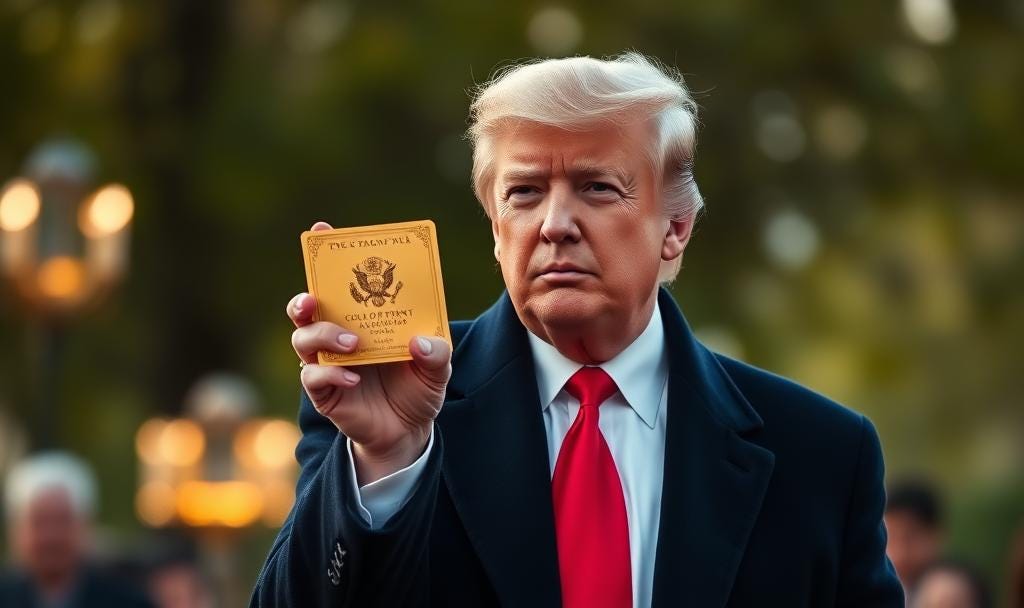Trump's "Gold Card" Visa: A $5 Million Ticket to US Residency Sparks Debate
President Donald Trump announced plans on February 25, 2025, to introduce a "Gold Card" visa program. This program would offer wealthy foreign investors a pathway to U.S. residency and eventual citizenship for a $5 million fee.
This initiative, intended to replace the existing EB-5 investor visa, aims to generate revenue, reduce the national debt, and attract successful individuals to contribute to the American economy. However, the proposal has ignited debate over its potential impact on immigration policy and fairness.
The "Trump Gold Card" Defined
The "Trump Gold Card," as Commerce Secretary Howard Lutnick referred to it, is designed as a "premium version of a Green Card" specifically for wealthy foreign investors. Trump has suggested that his administration could sell up to one million of these cards. The primary qualification for the Gold Card is a $5 million investment, a significant increase from the EB-5 visa program it aims to replace.
Trump stated that the card would provide "green card privileges, plus it will be a route to citizenship." He believes those obtaining the card will be "wealthy and successful and contribute significantly in spending, taxes, and job creation."
Replacing the EB-5 Visa
The Gold Card is set to replace the EB-5 visa program established by Congress in 1990 to attract foreign investment and stimulate job creation.
The EB-5 visa requires a foreign national to invest approximately $1 million in a business that hires at least ten workers. Commerce Secretary Howard Lutnick has been critical of the EB-5 program, calling it "full of nonsense, make-believe.”
"The EB-5 program… was filled with absurdities, illusions, and fraud, and it provided a low-cost avenue to obtain a green card. Therefore, the president has decided to terminate the EB-5 program," Lutnick stated.
In 2022, around 8,000 individuals received investor visas. However, participation in the EB-5 program has declined since 2016. A 2021 report from the U.S. Government Accountability Office (GAO) identified "significant fraud risks" within the EB-5 visa program, particularly regarding difficulties in tracing the sources of applicants' funds and potential biases.
Eligibility and Requirements
While the primary requirement for the Trump Gold Card is the $5 million investment, specific eligibility criteria and application process details remain unclear. Trump indicated that the program would be available to "affluent individuals" and that candidates would undergo extensive scrutiny to ensure they were "wonderful, world-class global citizens," as characterized by Lutnick. Unlike traditional investor visas, which typically require job creation, the Gold Card proposal, as announced, does not explicitly mention employment generation requirements.
Trump suggested there would be no definitive cap on the program, indicating the government could issue up to 10 million visas. He also stated that further details would be released in two weeks when these visa sales are expected to commence. While green card holders typically must reside in the U.S. as lawful permanent residents for five years before applying for citizenship, it remains uncertain whether those holding gold cards will have a shorter wait.
Legal and Political Challenges
Despite Trump's assertion that the initiative is "entirely legal," he faces scrutiny regarding his authority to implement such a program without Congressional approval. Trump has stated that he does not require Congressional approval because he is not establishing citizenship but rather introducing the card as a pathway to citizenship.
However, experts like Michelle Mittelstadt, the Migration Policy Institute spokesperson, disagree. She argues that while the executive branch has considerable flexibility in modifying existing visa programs, it lacks the power to establish new ones without Congressional approval. "The creation of a new visa category, irrespective of whether it leads to citizenship, necessitates Congressional consent," Mittelstadt stated.
Potential Benefits and Criticisms
Trump claims this program would generate trillions in revenue primarily intended to reduce the national debt while bringing successful individuals who would contribute to the American economy. He also expressed optimism regarding the demand from the business sector, stating, "I we will a lot I think's a th
The administration frames this initiative as part of a broader strategy to boost economic growth through foreign investment while simultaneously generating substantial revenue for the federal government through the application fees.
However, critics argue that the Gold Card prioritizes economic contribution over other considerations and could be seen as creating a direct purchase option for residency. The U.S. Government Accountability Office's report on the EB-5 visa highlights concerns about potential program misuse.
There appears to be no definitive cap on this new program. Trump has suggested that the government could issue up to 10 million visas to help alleviate the national deficit.
Future Perspective
The "Trump Gold Card" represents a potentially significant shift in U.S. immigration policy. It offers wealthy foreign nationals a direct path to permanent residency through a substantial financial investment. While the administration touts the potential economic benefits and streamlined process, questions remain about the legality of implementing the program without congressional approval and its long-term impact on the U.S. immigration system. Further details are expected in the coming weeks, which will likely shape the debate and determine the future of this controversial proposal.



